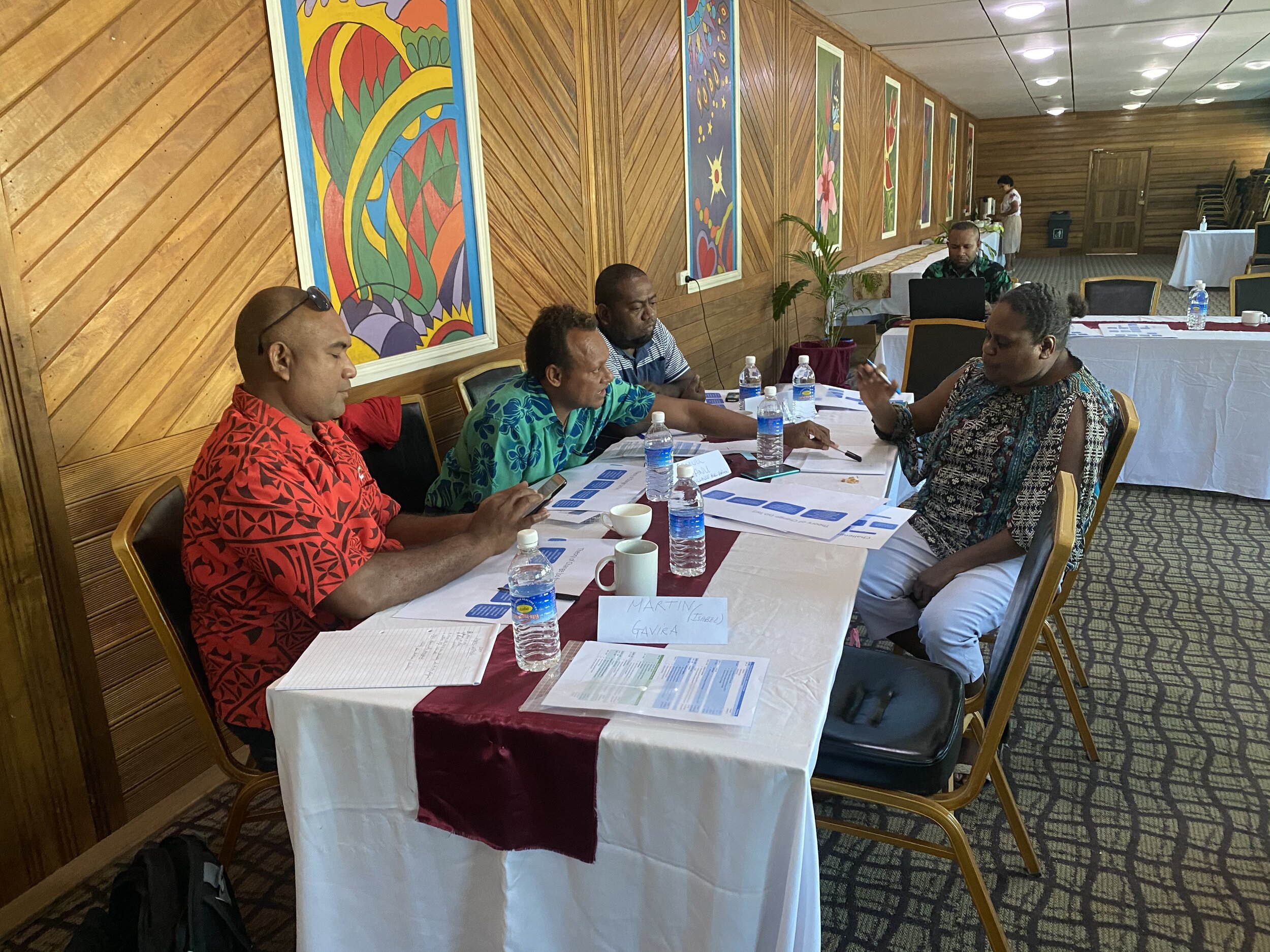Sols FETP: Theory of Change results
In our last blog, we shared the Sols FETP Theory of Change process. Here, we are pleased to share our results.
After two days of discussion, and some feedback on an initial map, this is the resulting Theory of Change map:
In brief, the participants articulated the long-term outcome for Sols FETP as a cadre of competent field epidemiologists will be available and dispersed across Solomon Islands. This overall outcome incorporated the participants’ view that field epidemiology capacity needs to be distributed across the countries’ 11 Provinces. An additional outcome and an impact statement were included beyond the ceiling of accountability, which outline the impact the program is likely to contribute to. Specifically, the program will likely contribute to high quality and appropriately used public health surveillance systems. In turn, evidence will be generated to support informed public health decisions. As field epidemiology capacity will be decentralised, evidence will support decisions made from the facility level all the way up to the National level. In fact, capacity at the facility level across the Provinces will support more timely interventions, such as for outbreak response, often mitigating the need for long and costly escalation processes to National decision makers.
Prior to achieving the overall outcome, the Theory of Change includes an intermediate outcome of having FETP fellows demonstrate core field epidemiology competencies and graduate from the program. This will be the result of fellows completing the five phases of an FETP, and assessing fellows to ensure they have achieved their core competencies.
The Theory of Change articulates three main pathways that will enable fellows to complete the five FETP phases. Each is supported by the foundational outcome to have a clear governance structure and operational support to implement Sols FETP. Governance will be led by a Steering Committee with a clearly articulated purpose, scope and Terms of Reference. The Steering Committee will be cornerstone to all three pathways. It will also engage with other committees, such as the National Research Ethics committee, to develop an ethics pathway that is contextually relevant for the program.
The first pathway links directly to appropriate recruitment of fellows to participate in the FETP. Alongside professional suitability, participants described the necessary personal attributes of fellows which should be included in a selection criteria and minimum entry requirement for fellows. These attributes include their commitment to the training and ability to manage time.
The second pathway concerned the technical capacity of the program. It is imperative that Sols FETP faculty and mentors have the competency and commitment to contribute to the program. Competency can be achieved through clear ToR and selection criteria for faculty and mentors, as well as ongoing capacity development through Train-the-Trainer style sessions. The technical capacity of faculty and mentors in turn will ensure that the FETP curriculum is appropriate and contextualised for Solomon Islands, both in terms of cultural relevance and health system requirements, while still aligning to global FETP standards.
The third pathway links to stakeholder engagement and support for Sols FETP. By engaging National and Provincial managers and key stakeholders, including through strategic communication with fellows’ workplace, appropriate fellows will both be recruited and supported by their managers and colleagues to complete the program. Workplaces will be engaged to develop operational strategies that support fellows by ensuring they have access to the resources they need to complete the FETP.
The Theory of Change workshop clarified key actions to support the long-term sustainability of Sols FETP, which highlight the key priorities and next steps for the program. These include:
The role of the Steering Committee
The Theory of Change highlighted the imperative of a Steering Committee to oversee governance and operational support for Sols FETP. PHESU will work within the broader framework of the MHMS and with technical support from the FEiA team to articulate the role of the Steering Committee and recruit appropriate personnel. A Sols FETP Program Coordinator will be recruited to support the Steering Committee and take responsibility for the day-to-day operational management of the program.
Fellow recruitment
The Steering Committee will develop a recruitment process to ensure suitable candidates are enrolled in each annual cohort of Sols FETP. Alongside the personal and professional attributes of suitable fellows, such as relevant public health experience and evidence of personal reliability, selection criteria will be responsive to broader public health and MHMS strategies, such as the role delineation policy.
Investment in faculty and mentors
Existing faculty and mentors will work with the Steering Committee to develop a Terms of Reference for their role that highlights faculty responsibilities that reinforce key deliverables. The FEiA team will produce and deliver training materials that support ongoing professional development of faculty and mentors, and particularly address self-identified needs.
Stakeholder engagement
In partnership with the FEiA team, the Sols FETP Steering Committee will determine a process through which the key stakeholders at the National and Provincial levels are engaged with FETP. This includes promoting the program in order to support widespread understanding of its purpose, and engaging with workplaces of potential fellows to ensure supportive environments are cultivated through which FETP fellows can thrive.
Monitoring, Evaluation and Learning
The Theory of Change provides a framework which summarises what Sols FETP is seeking to achieve over the next five years. In order to measure change, As a priority, the indicators that were discussed during the Theory of Change workshop will be further developed and presented in a SMART (Specific, Measurable, Achievable, Relevant, Timebound) format. The key features of the Theory of Change map will be aligned with the indicators in order to measure progress towards them. The Theory of Change map and corresponding indicators will be reviewed annually by the Steering Committee, faculty and FEiA team, with updates made according to insights gained or context changes. Progress towards indicators will be summarised in an annual report.




